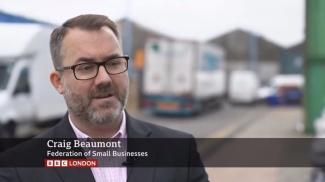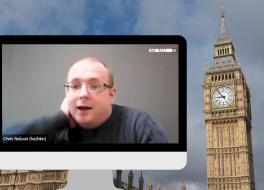
Stammering in a career that's all about talking

Lobbyist and media spokesperson Craig Beaumont tells us about a career that has centred around speaking with politicians and high-profile figures.
My mum says I was a very talkative, chatty baby. But as I grew up I became a shy kid and teenager with a stammer. When I became aware of it, my confidence fell. I'd worry about speaking, which exacerbated things so much that when I actually spoke I'd get embarrassed and shut up. I'd try to avoid certain letters and words beginning with 'P', 'T' or 'ST' sounds. I ended up having speech therapy where I remember I had to deliberately stammer 10 times on the toughest letters. I started to feel that maybe I had some agency on how to manage it.
But this was knocked back at school. I loved music and academic study, but my stammer became part of being a pretty isolated, and slightly bullied, gay teenager. I was much better outside of school when I was working part-time. And when I won the place I wanted at University, I was keen for a total reset — to leave the problems behind.
Shyness evaporating
I had a passion for politics (potentially not great, lots of words beginning with 'P' — politics, Parliament, public affairs!) too, which took off, and I decided to study it at University. The minute I arrived at Uni, the change of scene was so dramatic — totally LGBT+ friendly, and everyone there was understanding when I stammered. The shyness just evaporated and it never came back. My core stammer was still there, like when I was presenting in research seminars, but I wasn't nervous about it beforehand or embarrassed about it afterwards. If I stammered, I was able to quietly acknowledge it to myself and move on to say something interesting. I found that people were there to hear what I had to say; they didn't care if I stammered.
I was lucky that my first job after Uni was at 10 Downing Street, working on Prime Minister's Questions for Tony Blair.
That gave me confidence and ever since my career has been focused on lobbying and campaigning, which has involved a LOT of talking and persuasion. I was lucky that my first job after Uni was at 10 Downing Street, working on Prime Minister's Questions for Tony Blair. I was very junior but I was taking lots of calls, persuading other Government departments, and running around the building as well as around Parliament. Even in high-pressured moments, giving advice to very important people was something I could just about do; the key thing was the content of what I was saying — the quality of advice/judgement and getting the message across was the main thing rather than whether or not I stammered.

Spokesperson
Now, I've just marked 10 years at the Federation of Small Businesses, where day-to-day I'm our chief lobbyist and media spokesperson. I talk about issues facing small businesses and the self-employed to the Government, Parliament, the press and broadcast media.
I stammer more when I'm tired. But stick me in a meeting with a politician and boy, I'll take the opportunity to talk to them. Put me on a webinar with a big figure like Sir Chris Whitty to extract COVID advice for small businesses, and I'm the same. Or indeed in front of a camera, or speaking with a journalist. As long as I know my subject and I'm passionate about what I'm talking about, then I know that comes through — and I feel confident. Stammering, or pausing for a second, just takes a bit more time.
As long as I know my subject and I'm passionate about what I'm talking about, then I know that comes through — and I feel confident.
I wouldn't say I'm especially smooth and polished like many people who broadcast, but I've never had negative comments when I stammer. I think it helps that it's just part and parcel of being real and passionate about a cause, rather than being 'ultra-smooth'.
I would love to see more people who stammer talking about current affairs on the airwaves. We're seeing a lot more diversity among presenters, but this should also be the case for those on the other side of the microphone. So, if you've got a stammer and are involved in a cause or are passionate about something, don't hesitate to put yourself forward. Stammering's profile is so high now in comparison to virtually zilch when I was young, and that should help.
It's so important for people to realise they're not alone; I'm grateful that teenagers these days have public examples of people who stammer and are good at what they do. The idea that a US President like Joe Biden stammers and talks about it is so, so huge!
A stammer is an everyday thing, it's not a sign of weakness or low ability. It doesn't need to be a barrier and if anything it shows we're human. Now, for me, I've come full circle, really — these days you can't shut me up.
You can follow me on Insta, X/Twitter and Threads using @craigie_b and for LinkedIn and Facebook, search for 'craigbeaumont'.
Read more Your Voice articles. Would you like to write an article? See Submit Something For The Site or email editor@stamma.org for details.































